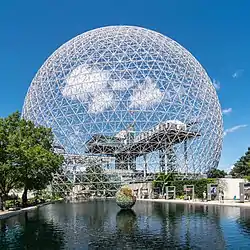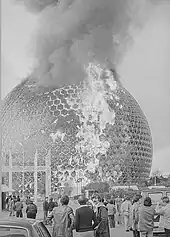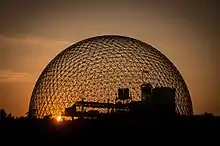Montreal Biosphere
The Biosphere, also known as the Montreal Biosphere, is a museum dedicated to the environment in Montreal, Quebec, Canada. It is housed in the former United States pavilion constructed for Expo 67 located within the grounds of Parc Jean-Drapeau on Saint Helen's Island. The museum's geodesic dome was designed by Buckminster Fuller.
 | |
| Established | 1967 |
|---|---|
| Location | 160 Tour-de-l'Isle road Montreal, Quebec H3C 4G8 |
| Type | environment museum |
| Owner | Space for Life |
| Public transit access | |
| Website | espacepourlavie |
History
Expo 67
The structure was originally built as the United States pavilion at Expo 67. The United States Information Agency, which was responsible for the U.S. presence at the exposition, revealed its plans for the pavilion in June 1965.[1] The geodesic dome exterior was designed by R. Buckminster Fuller with Shoji Sadao and Geometrics Inc.,[2] while the interior structures and exhibits were designed by Cambridge Seven Associates.[1] The construction project, led by the George A. Fuller Company, began in December 1965.[3]
The Expo opened on 27 April 1967 and ran until 29 October 1967.[4][5] Upon entering the pavilion, visitors ascended a 135-foot (41 m) escalator, reported to be the longest unsupported escalator in the world, to reach the exhibit platforms.[6][7] The two uppermost platforms held "Destination: Moon", an exhibit on NASA's space programs; spacecraft were hung from the dome's steel frame, including the Freedom 7, Gemini 7, and Apollo AS-202 capsules.[8][9][10] On the mezzanine level, the "American Spirit" exhibit displayed a wide variety of artifacts, including American Indian crafts, folk art objects, guitars owned by famous musicians, a collection of dolls, and an array of almost 300 hats, representing a range of regions and occupations.[11][12][13] Other attractions included a gallery of Hollywood memorabilia and "American Painting Now", an exhibit of 22 large-scale works by contemporary American artists.[14][7] A 300-seat theater screened A Time to Play, a multi-screen film by Art Kane showing American schoolchildren playing various playground games.[15][16]
Man and His World (1968–1976)
After the Expo, the site continued to operate as Man and His World, an ongoing exhibition held every summer. Like most countries at the Expo, the United States donated its pavilion structure to the City of Montreal for use in the exhibition.[17][18] The pavilion was renamed to Biosphere and opened in 1968 as an aviary and arboretum, featuring four suspended gardens and hundreds of birds.[18][19]
For the 1971 season, the United States returned to use Biosphere as its national pavilion, with a display titled "Visit USA", sponsored by the United States Travel Service and the Smithsonian Institution.[20][21] The pavilion reverted to its nature theme in 1972, with the addition of a troop of baboons, a Japanese garden, and a children's adventure area, Sleeping Beauty's Fantasy Land.[22][23]
In 1973, Biosphere was converted to an anti-pollution exhibit titled "Man and His Environment", sponsored by Hydro-Québec.[24][25]

1976 fire
On 20 May 1976, Biosphere was severely damaged in a fire. Sparked by a welding crew during structural renovations, the fire burned away the building's transparent acrylic bubble, but the hard steel truss structure remained.[26]
After the fire, the city was determined to maintain the Biosphere and continue using it as an open-air structure, possibly containing suspended gardens or a concert venue.[27] Plans were announced in 1977 to transform it into a recreational area named Man at Play, but they did not come to fruition.[28] By 1980, the building's future was still unclear, as the city was cleaning it up in hopes of finding a partner to redevelop it.[29]
Ultimately, the building remained closed and unused until 1990.[30][31]
Rebirth as museum

In August 1990, Environment Canada committed $17.5 million to turn Biosphere into an interactive museum showcasing and exploring the water ecosystems of the Great Lakes-Saint Lawrence River regions.[31] The museum opened on 6 June 1995.[32][33] It inhabits a set of enclosed buildings designed by Éric Gauthier, inside the original steel skeleton.
The Biosphere changed its name in 2007 to become an environment museum. It offers interactive activities and presents exhibitions about the major environmental issues related to water, climate change, air, ecotechnologies, and sustainable development.
The museum shows support for multiple causes by lighting up in different colors on special occasions. In April 2020, it lit up in multiple colors to show support during the COVID-19 pandemic.[34] In June 2022, the museum lit up in green in support of World Environment Day.[35]
In 2021, control of the Biosphere was transferred from Environment Canada to Space for Life, the City of Montreal's complex of nature museums.[36][37]
Pavilion
The museum is housed in the former pavilion built by the United States for Expo 67. The architectural engineer of the geodesic dome was Buckminster Fuller.[38] The building originally formed an enclosed structure of steel and acrylic cells, 76 metres (249 ft) in diameter and 62 metres (203 ft) high. It is a Class 1 (icosahedral, as differentiated from Class 2 domes, which are dodecahedral, and Class 3 ones, which are tetrahedral), 32-frequency, double-layer dome, in which the inner and outer layers are connected by a latticework of struts. (There has occasionally been confusion in mistakenly referring to this as a 16-frequency dome due to the fact that there are 15 hexagonal polygons from each pentagonally polygonal vertex of this icosahedral polyhedron to the adjacent vertex. However, the standard for measuring dome frequency is the number of triangles from vertex to vertex. Since there are two triangles from one side to the opposite side of a hexagon, there are actually 30 triangles from the edge of each pentagonal vertex in this dome to the next, plus the triangle that comprises one-fifth of the pentagonal vertex at each end of the length from one vertex to the adjacent vertex: totaling 32 triangles from the center of each vertex to the center of the next vertex.)
A complex system of shades was used to control its internal temperature. The sun-shading system was an attempt by the architect to reflect the same biological processes that the human body relies on to maintain its internal temperature.[39] Fuller's original idea for the geodesic dome was to incorporate "pores" into the enclosed system, further likening it to the sensitivity of human skin,[39] but the shading system failed to work properly and was eventually disabled.[39]
Architects from Golden Metak Productions designed the interior exhibition space. Visitors had access to four themed platforms divided into seven levels. The building included a 37-metre-long (121 ft) escalator, the longest ever built at the time. The Minirail monorail ran through the pavilion.[40] In 2021, The New York Times picked the dome as one of "the 25 Most Significant Works of Postwar Architecture".[41]
Legacy
The carbon molecule buckminsterfullerene was named for Biosphere's architect, R. Buckminster Fuller, because the molecule's structure, resembling a geodesic sphere, reminded its co-discoverer, Harold Kroto, of his visit to the pavilion at Expo 67.[42][43]
The structure influenced the design of Spaceship Earth at EPCOT Center in Walt Disney World.[44] Disney designer John Hench expanded on Biosphere's three-quarter-sphere to create a full sphere appearing to be balanced on legs.[44]
In popular culture
The structure was used prominently in the original Battlestar Galactica television series episode "Greetings from Earth". Scenes for Robert Altman's post-apocalyptic ice age film Quintet were shot on site as well.
The Biosphere appears in the 2003 animated Jacob Two-Two TV episode "Jacob Two-Two and the Notorious Knit Knapper", in which it is used as the headquarters for a group of seniors who plan on knitting a giant tea cosy to cover Montreal.
The Biosphere made an appearance during the finales of The Amazing Race: Family Edition and The Amazing Race Canada 4.[45][46]
The Biosphere appears in the game Civilization VI (in the New Frontiers DLC) as a World Wonder, where it increases the appeal of marsh and rainforest tiles, and boosts renewable power and tourism.[47]
References
- "U.S.'s Canada fair exhibit plans outlined". Minneapolis Tribune. 27 June 1965 – via Newspapers.com.
- Rebecca Dalvesco (October 2017). "R. Buckminster Fuller, the Expo '67 Pavilion and the Atoms for Peace Program". Leonardo. 50 (5): 486. JSTOR 26808487.
- "Groundwork gets started on U.S. Expo pavilion". The Montreal Star. 20 December 1965 – via Newspapers.com.
- John Mahoney (28 April 1967). "Oh, wowee! C'est magnifique! It's turned on! It's Expo!". Rutland Daily Herald – via Newspapers.com.
- Douglas S. Crocket (30 October 1967). "Montreal's mayor plans to keep Expo". The Boston Globe – via Newspapers.com.
- ""Building going up" is common cry now at Canada's Exposition 1967". Transcript-Telegram. Holyoke, MA. New York Times News Service. 16 November 1966 – via Newspapers.com.
- "Escalator snarls U.S. pavilion tour". The Montreal Star. 28 April 1967 – via Newspapers.com.
- "10 years after the first step into space, it's all on display by U.S. and Soviet". The Gazette. Montreal. 28 April 1967 – via Newspapers.com.
- Frances Spatz Leighton (23 April 1967). "7 men in a bubble". The Des Moines Register – via Newspapers.com.
- John Uri (25 August 2021). "55 Years Ago: Apollo AS-202, Final Test Flight Before Planned First Crew Mission". NASA. Retrieved 2023-07-30.
- "The American Spirit" (PDF) (Press release). Office of the United States Commissioner General, Canadian World Exhibition, Montreal, 1967. Retrieved 2023-08-26.
- Douglas S. Crocket (24 April 1967). "U.S. Expo '67 exhibit draws laughs". The Boston Globe – via Newspapers.com.
- Sylvie Reice (12 June 1967). "Cheers for our pavilion!". Transcript-Telegram. Holyoke, MA. Hall Syndicate – via Newspapers.com.
- Robert Mayer (28 April 1967). "U.S. pavilion: striking outside, but a 'sterile disaster' inside". The Buffalo News – via Newspapers.com.
- Brian Real (2022). "Designing Diplomacy: Jack Masey and Multiscreen Cinema at Expo 67". Journal of E-Media Studies. 6 (1). Retrieved 2023-07-30.
- "U.S. movie is hit of Expo '67". Janesville Daily Gazette. Janesville, WI. 26 July 1967 – via Newspapers.com.
- Dave MacDonald (21 July 1967). "Expo site future still anyone's guess". Star-Phoenix. Saskatoon – via Newspapers.com.
- "Expo 67 now 'Man and His World'". Detroit American. 5 May 1968 – via Newspapers.com.
- Cynthia Gunn (17 May 1968). "Biosphere guaranteed to be "show-stopper"". The Montreal Star – via Newspapers.com. (Part 2 of article)
- Hubert Bauch (14 April 1971). "Fun, folklore for fair". The Gazette. Montreal – via Newspapers.com.
- Al Borcover (18 July 1971). "Where it's at in Scandinavia". Chicago Tribune – via Newspapers.com.
- "M&HW's Biosphere to return to nature theme this year". The Gazette. Montreal. 3 August 1972 – via Newspapers.com.
- "Children's adventure land featured at Biosphere". The Montreal Star. 3 August 1972 – via Newspapers.com.
- Brian Moore (20 June 1973). "$700,000 ecology exhibit unveiled". The Montreal Star – via Newspapers.com.
- "What's On". The Montreal Star. 24 August 1973 – via Newspapers.com.
- Bolton, KC (2009-01-31). "Photo du jour - Biosphere Burning". Spacing Montreal. Retrieved 2009-01-31.
- "No ruling on future of burned Biosphere". The Montreal Star. 28 August 1976 – via Newspapers.com.
- "Expo dome to become Man at Play". Calgary Herald. 3 September 1977 – via Newspapers.com.
- "City to clean up charred Biosphere". The Gazette. Montreal. 28 May 1980 – via Newspapers.com.
- A View On Cities (2007). "Biosphere, Montreal". Montréal Attractions. Retrieved 2007-06-07.
- Environment Canada (2006-01-24). "A Short History of the Biosphère". The Sphere. Archived from the original on 2007-01-23. Retrieved 2007-06-07.
- Henry Lehmann (4 June 1995). "Biosphere's back". The Gazette. Montreal – via Newspapers.com. (Part 2 of article)
- Peggy Curran (7 June 1995). "The Toopes are remembered as far away as Newfoundland". The Gazette. Montreal – via Newspapers.com.
- Rowe, Daniel J. (2020-04-05). "Biosphere will follow the rainbow and shine multi-colour display". Montreal. Retrieved 2022-06-09.
- Carpenter, Lorraine (2022-06-05). "Montreal marks World Environment Day". Cult MTL. Retrieved 2022-06-09.
- "Governments of Canada and Quebec and City of Montréal commit to the Biosphere's future" (Press release). Ministry of the Environment and the Fight Against Climate Change. 12 April 2021. Retrieved 2023-07-03.
- "Montréal Biosphère has officially reopened". The Suburban. 15 August 2021. Retrieved 2023-07-03.
- Langdon, David (25 November 2014). "AD Classics: Montreal Biosphere / Buckminster Fuller". ArchDaily. Retrieved 5 September 2017.
- Massey, Jonathan (2012). "Buckminster Fuller's Reflexive Modernism". Design and Culture. 4 (3): 325–344. doi:10.2752/175470812X13361292229159. S2CID 144621805.
- "USA PAVILION AT EXPO video newsreel film". Newsreel. British Pathe. Retrieved 12 November 2011.
- Soller, Kurt; Snyder, Michael (2 August 2021). "The 25 Most Significant Works of Postwar Architecture". The New York Times. Retrieved 13 August 2021.
- John Lownsbrough (2012). The Best Place To Be: Expo 67 and Its Time. Toronto: Allen Lane. p. 118.
- J.E. Baggott (1994). Perfect Symmetry: The Accidental Discovery of Buckminsterfullerene. Oxford University Press. pp. 57–58.
- John Hench (2003). Designing Disney: Imagineering and the Art of the Show. Disney Editions. p. 54.
- Sellers, Andrea (December 14, 2005). "The Linz Family wins CBS' 'The Amazing Race: Family Edition'". Reality TV World. Retrieved December 31, 2019.
- "Steph and Kristen Win Season 4 of CTV's THE AMAZING RACE CANADA". Newswire. September 14, 2016. Retrieved December 31, 2019.
- "Civilization VI - Byzantium & Gaul Pack". Firaxis Games. Retrieved 24 September 2020.
External links
- Official website (in French and English)